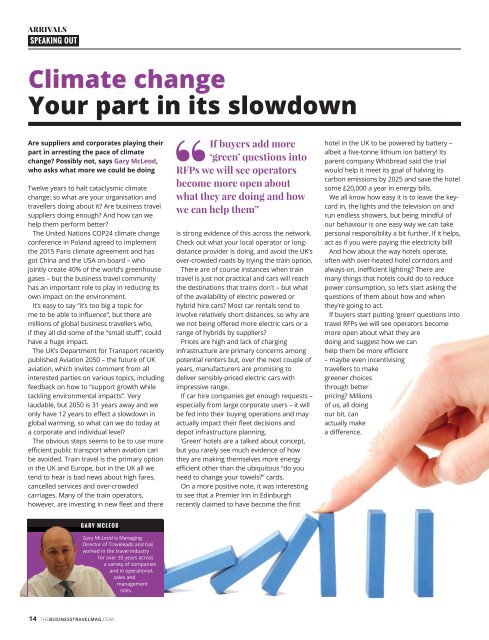You also want an ePaper? Increase the reach of your titles
YUMPU automatically turns print PDFs into web optimized ePapers that Google loves.
ARRIVALS<br />
SPEAKING OUT<br />
Climate change<br />
Your part in its slowdown<br />
Are suppliers and corporates playing their<br />
part in arresting the pace of climate<br />
change? Possibly not, says Gary McLeod,<br />
who asks what more we could be doing<br />
Twelve years to halt cataclysmic climate<br />
change: so what are your organisation and<br />
travellers doing about it? Are business travel<br />
suppliers doing enough? And how can we<br />
help them perform better?<br />
<strong>The</strong> United Nations COP24 climate change<br />
conference in Poland agreed to implement<br />
the 2015 Paris climate agreement and has<br />
got China and the USA on-board – who<br />
jointly create 40% of the world’s greenhouse<br />
gases – but the business travel community<br />
has an important role to play in reducing its<br />
own impact on the environment.<br />
It’s easy to say “it’s too big a topic for<br />
me to be able to influence”, but there are<br />
millions of global business travellers who,<br />
if they all did some of the “small stuff”, could<br />
have a huge impact.<br />
<strong>The</strong> UK’s Department for Transport recently<br />
published Aviation 2050 – the future of UK<br />
aviation, which invites comment from all<br />
interested parties on various topics, including<br />
feedback on how to “support growth while<br />
tackling environmental impacts”. Very<br />
laudable, but 2050 is 31 years away and we<br />
only have 12 years to effect a slowdown in<br />
global warming, so what can we do today at<br />
a corporate and individual level?<br />
<strong>The</strong> obvious steps seems to be to use more<br />
efficient public transport when aviation can<br />
be avoided. Train travel is the primary option<br />
in the UK and Europe, but in the UK all we<br />
tend to hear is bad news about high fares,<br />
cancelled services and over-crowded<br />
carriages. Many of the train operators,<br />
however, are investing in new fleet and there<br />
If buyers add more<br />
‘green’ questions into<br />
RFPs we will see operators<br />
become more open about<br />
what they are doing and how<br />
we can help them”<br />
is strong evidence of this across the network.<br />
Check out what your local operator or longdistance<br />
provider is doing, and avoid the UK’s<br />
over-crowded roads by trying the train option.<br />
<strong>The</strong>re are of course instances when train<br />
travel is just not practical and cars will reach<br />
the destinations that trains don't – but what<br />
of the availability of electric powered or<br />
hybrid hire cars? Most car rentals tend to<br />
involve relatively short distances, so why are<br />
we not being offered more electric cars or a<br />
range of hybrids by suppliers?<br />
Prices are high and lack of charging<br />
infrastructure are primary concerns among<br />
potential renters but, over the next couple of<br />
years, manufacturers are promising to<br />
deliver sensibly-priced electric cars with<br />
impressive range.<br />
If car hire companies get enough requests –<br />
especially from large corporate users – it will<br />
be fed into their buying operations and may<br />
actually impact their fleet decisions and<br />
depot infrastructure planning.<br />
‘Green’ hotels are a talked about concept,<br />
but you rarely see much evidence of how<br />
they are making themselves more energy<br />
efficient other than the ubiquitous “do you<br />
need to change your towels?” cards.<br />
On a more positive note, it was interesting<br />
to see that a Premier Inn in Edinburgh<br />
recently claimed to have become the first<br />
hotel in the UK to be powered by battery –<br />
albeit a five-tonne lithium ion battery! Its<br />
parent company Whitbread said the trial<br />
would help it meet its goal of halving its<br />
carbon emissions by 2025 and save the hotel<br />
some £20,000 a year in energy bills.<br />
We all know how easy it is to leave the keycard<br />
in, the lights and the television on and<br />
run endless showers, but being mindful of<br />
our behaviour is one easy way we can take<br />
personal responsibility a bit further. If it helps,<br />
act as if you were paying the electricity bill!<br />
And how about the way hotels operate,<br />
often with over-heated hotel corridors and<br />
always-on, inefficient lighting? <strong>The</strong>re are<br />
many things that hotels could do to reduce<br />
power consumption, so let’s start asking the<br />
questions of them about how and when<br />
they’re going to act.<br />
If buyers start putting ‘green’ questions into<br />
travel RFPs we will see operators become<br />
more open about what they are<br />
doing and suggest how we can<br />
help them be more efficient<br />
– maybe even incentivising<br />
travellers to make<br />
greener choices<br />
through better<br />
pricing? Millions<br />
of us, all doing<br />
our bit, can<br />
actually make<br />
a difference.<br />
GARY MCLEOD<br />
Gary McLeod i s Managing<br />
Director of <strong>Travel</strong>eads and has<br />
worked in the travel industry<br />
for over 35 years across<br />
a variety of companies<br />
and in operational,<br />
sales and<br />
management<br />
roles.<br />
14 THEBUSINESSTRAVELMAG.COM

















